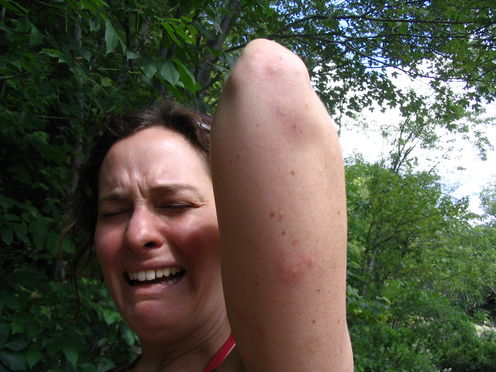
There are up to 400 chemical compounds on human skin that could play a role in attracting mosquitoes. sookie, CC BY-SA
By Cameron Webb, University of Sydney
There’s always one in a crowd, a sort of harbinger of the oncoming mosquito onslaught: a person mosquitoes seem to target more than others. What is it about these unlucky chosen few that makes them mosquito magnets?
There are hundreds of mosquito species and they all have slightly different preferences when it comes to what or who they bite. But only females bite; they need a nutritional hit to develop eggs.
Finding someone to bite
Mosquitoes are stimulated by a number of factors when seeking out a blood meal. Initially, they’re attracted by the carbon dioxide we exhale. Body heat is probably important too, but once the mosquito gets closer, she will respond to the smell of a potential blood source’s skin.
Studies have suggested blood type (particularly type O), pregnancy and beer drinking all make you marginally more attractive to mosquitoes. But most of this research uses only one mosquito species. Switch to another species and the results are likely to be different.
There are up to 400 chemical compounds on human skin that could play a role in attracting (and perhaps repulsing) mosquitoes. This smelly mix, produced by bacteria living on our skin and exuded in sweat, varies from person to person and is likely to explain why there is substantial variation in how many mozzies we attract. Genetics probably plays the biggest role in this, but a little of it may be down to diet or physiology.
One of the best studied substances contained in sweat is lactic acid. Research shows it’s a key mosquito attractant, particularly for human-biting species such as Aedes aegypti. This should act as fair warning against exercising close to wetlands; a hot and sweaty body is probably the “pick of the bunch” for a hungry mosquito!
Probably the most famous study about their biting habits demonstrated that the mosquitoes that spread malaria (Anopheles gambiae) are attracted to Limburger cheese. The bacteria that gives this cheese its distinctive aroma is closely related to germs living between our toes. That explains why these mosquitoes are attracted to smelly feet.
But when another mosquito (such as Aedes aegypti) is exposed to the same cheese, the phenomenon is not repeated. This difference between mosquitoes highlights the difficulty of studying their biting behaviors. Even pathogens such as malaria may make us more attractive to mosquitoes once we’re infected.

Only females bite because they need a nutritional hit to develop eggs. Sean McCann/Flickr, CC BY-NC-SA
Researchers are trying to unscramble the irresistible smelly cocktails on the skins of “mosquito magnets”. But the bad news is that if you’re one of these people, there isn’t much you can do about it other than wearing insect repellents.
The good news is that you may one day help isolate a substance, or mixes of substances, that will help them find the perfect lure to use in mosquito traps. We could all then possibly say goodbye to topical insect repellents altogether.
Attraction or reaction?
Sometimes, it’s not the bite as much as the reaction that raises concerns. Think of the last time the mosquito magnets in your circle of friends started complaining about being bitten after the event where the purported mosquito feast took place. At least, they appear to have attracted more than the “bite free” people who were also at the picnic, or concert or whatever.
But just because some people didn’t react to mosquito bites, doesn’t mean they weren’t bitten. Just as we do with a range of environmental, chemical or food allergens, we all differ in our reaction to the saliva mosquitoes spit while feeding.
People who don’t react badly to mosquito bites may think they haven’t been bitten when they’ve actually been bitten as much as their itchy friends. In fact, while some people attract more mosquito bites than others, there’s unlikely to be anyone who never, ever, gets bitten.
The problem is that people who don’t react to mosquito bites may all too easily become complacent. If you’re one of them, remember that it only takes one bite to contract a mosquito-borne disease.
Finally, there is no evidence from anywhere in the world that there is something you can eat or drink that will stop you being bitten by mosquitoes. No, not even eating garlic, or swallowing vitamin B supplements.
Perhaps if we spent as much time thinking about how to choose and use mosquito repellents as we do about why mosquitoes bite our friends and family less than us, there’d be fewer bites all around.![]()
Cameron Webb, Clinical Lecturer and Principal Hospital Scientist at University of Sydney, and the Department of Medical Entomology have been engaged by a wide range of insect repellent and insecticide manufacturers to provide testing of products and provide expert advice on mosquito biology. This article was originally published on The Conversation. Read the original article.




Comments